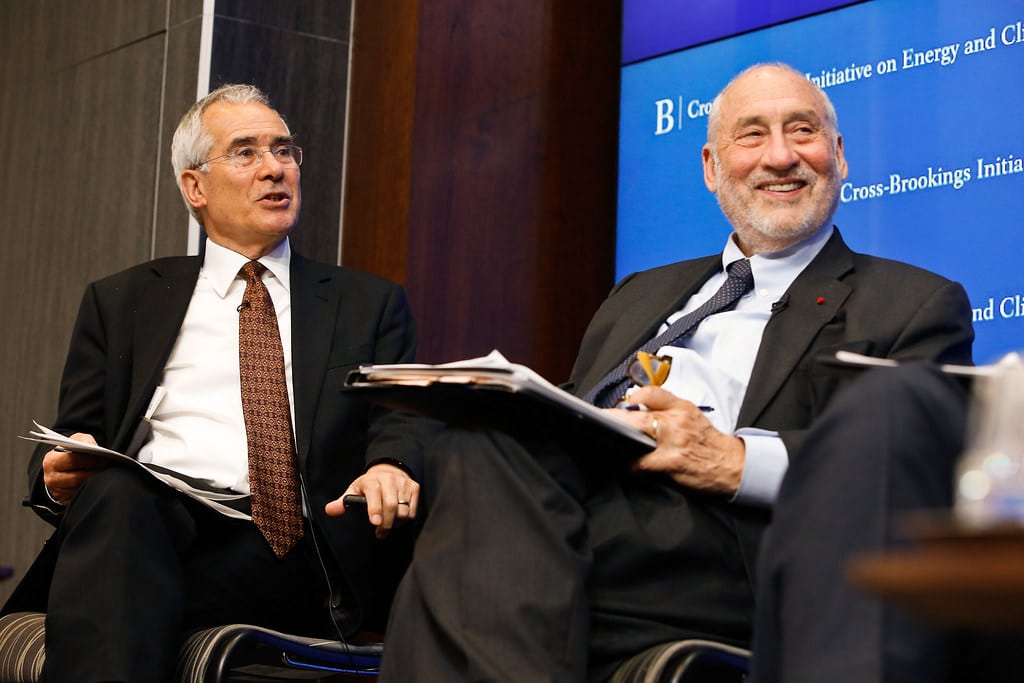
Global finance chiefs welcome green recovery from Covid-19, as proposed by economists Stiglitz and Stern
-
Climate positive policies offer superior economic characteristics and returns on investment for governments
-
Public opinion is shifting in favour of climate action and ‘building back better’ in response to Covid-19
-
A fossil fuel-based recovery will spell the end for keeping global warming below 1.5C
Two of the world’s leading economists, Joseph Stiglitz and Lord Nicholas Stern, have issued a hard-hitting working paper calling for a green recovery in response to the Covid-19 crisis that has brought the global economy to its knees.
The report, entitled ‘Will COVID-19 fiscal recovery packages accelerate or retard progress on climate change?‘, has received a positive response. For the paper, the authors surveyed 231 finance chiefs from 53 countries including all G20 nations, to ascertain their perspectives on COVID-19 fiscal recovery packages.
The results were in favour of a green recovery. The report states, ‘Our results suggest that, in many cases, experts think that climate-positive policies also offer superior economic characteristics.’
Tipping points – time to ‘build back better’
The paper opens by likening the climate emergency to the COVID-19 emergency, ‘just in slow motion and much graver’.
‘Both involve market failures, externalities, international cooperation, complex science, questions of system resilience, political leadership, and action that hinges on public support. Decisive state interventions are also required to stabilise the climate, by tipping energy and industrial systems towards newer, cleaner, and ultimately cheaper modes of production that become impossible to outcompete.’
Addressing the question will such action be forthcoming it says public support for increased action on climate change could ‘find new impetus if, humbled by the ability of ‘natural’ forces to shock the global economy, humans recalibrate our sense of omnipotence.’
It notes that ‘opinion polls in many countries show that people are noticing the clean air, uncongested roads, the return of birdsong and wildlife, and are asking whether ‘normal’ was good enough; could we not ‘build back better’ (Ipsos, 2020)?’
A fossil fuel-based recovery will be the end game for climate action
It warns that decisions being taken now on Covid-19 fiscal recovery packages will have a significant impact on whether globally agreed climate goals are met. And it warns we are in the last chance saloon. A fossil fuel-based recovery will essentially be the end game for climate action.
The paper identifies stimulus policies that are perceived to deliver large economic multipliers, reasonably quickly, and shift our emissions trajectory towards net zero. It says, ‘The recovery packages can either kill these two birds with one stone – setting the global economy on a pathway towards net-zero emissions – or lock us into a fossil system from which it will be nearly impossible to escape.’
The green recovery has ‘high overall desirability’ amongst finance chiefs
The paper says that pound for pound, investment in green energy technology delivers three times as many jobs than would be created by investment in fossil fuels and makes five policy recommendations (plus one item specific to low to middle income countries (LMICs)) that it says are well-placed to contribute to achieving economic and climate goals. These are:
— clean physical infrastructure investment,
— building efficiency retrofits,
— investment in education and training to address immediate unemployment from COVID-19 and structural unemployment from decarbonisation,
— natural capital investment for ecosystem resilience and regeneration, and
— clean R&D investment.
For LMICs, rural support spending is another high-value policy item
From its survey of 231 finance ministry officials, central bank officials, and other economists, representing 53 countries including all G20 nations, to ascertain their perspectives on COVID-19 fiscal recovery packages, the paper concludes, ‘Many climate-positive policies were perceived by our respondents to have high overall desirability; most climate-negative policies had relatively low desirability. Long run multipliers of climate-positive policies were found to be high, reflective of strong return on investment for government spending.’

